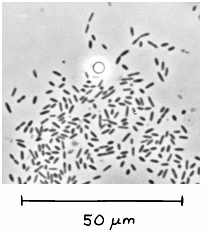Strain Hxd3 was isolated from the saline water phase of an oil-water separator from a northern German oil field (1,2). Hxd3 is a delta-proteobacterium capable of utilizing C12-C20 alkanes as growth substrates. Alkane degradation in Hxd3 involves the activation of alkanes via carboxylation at C3, with subsequent elimination of the terminal and subterminal carbons. This yields a fatty acid that is one carbon shorter than the parent alkane (3). Hxd3 is the ONLY pure culture that is known to carboxylate aliphatic hydrocarbons. 1. Aeckersberg, F., F. Bak, and F. Widdel. 1991. Anaerobic oxidation of saturated hydrocarbons to CO2 by a new type of sulfate-reducing bacterium. Arch. Microbiol. 156:5-14. 2. Aeckersberg, F., F. A. Rainey, and F. Widdel. 1998. Growth, natural relationships, cellular fatty acids and metabolic adaptation of sulfate-reducing bacteria that utilize long-chain alkanes under anoxic conditions. Arch. Microbiol. 170:361-369. 3. So, C. M., C. D. Phelps, and L. Y. Young. 2003. Anaerobic transformation of alkanes to fatty acids by a sulfate-reducing bacterium, strain Hxd3. Appl Environ Microbiol 69:3892-900. |
||
|
||
Desulfococcus (Candidatus) oleovorans Hxd3

